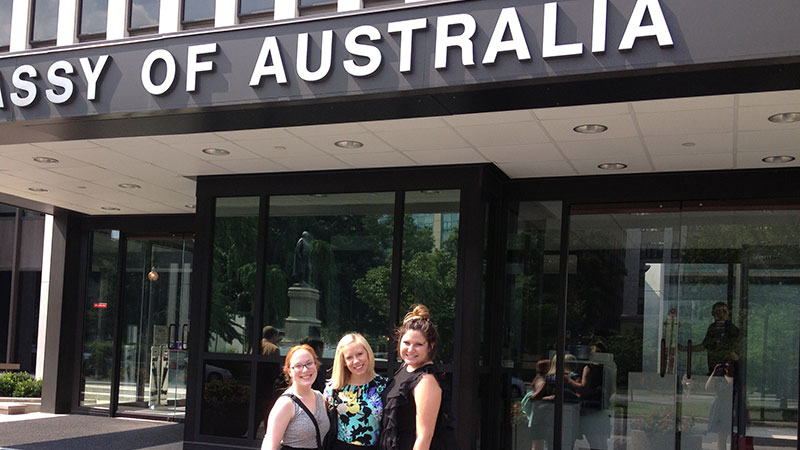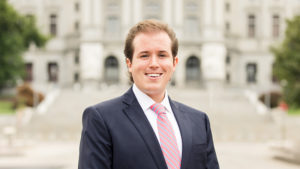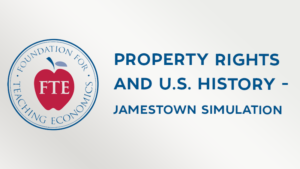
We hope you enjoy these top news stories about TFAS activities, alumni and events this week. Please visit us on social media for additional up-to-the-moment TFAS news and information and sign up to receive weekly updates.
TFAS alumni, staff and faculty continue to make headlines. Read news, analysis and updates by visiting this week’s “Quick Links.”
Capital Semester Students Explore US-Australia Relations in Webinar Briefing
To commemorate 80 years of diplomatic relations between the U.S. and Australia, TFAS Capital Semester students participated in an exclusive webinar meeting with the Australian Embassy in D.C.
Following a virtual conversation with Australian diplomats Rebecca Allen and Chelsea Porter, TFAS students had the chance to ask questions and learn more about the role diplomacy plays in our global society. A recent graduate of Spelman College, Darrielle Fair ’20 said she found the webinar both informative and insightful.
“I enjoyed hearing Bec and Chelsea speak about their day to day operations at the embassy and some of the cultural barriers they have had to overcome on a regular basis with the support of their team to ensure they are maintaining Australian-US relations,” Fair said.
Read more about the briefing at TFAS.org/AustraliaCS20.
TFAS Welcomes Inaugural John Farley Memorial Alumni Fund Fellow
TFAS is pleased to welcome Charles McElwee as the inaugural recipient of the John Farley Memorial Fund Alumni Fellowship, which was renamed this year to honor TFAS friend and former colleague, the late John Farley.

More than 100 Novak Fellows looked to John as a leader, mentor and friend during his leadership of the Robert Novak Journalism Fellowship program for more than 20 years. His legacy lives on through his family, the work of countless Fellows and this newly renamed Fellowship.
McElwee is the managing editor at the Commonwealth Foundation, and was previously assistant editor of the Manhattan Institute’s City Journal. A lifelong Pennsylvanian, he has worked in the government affairs and communications sectors in Harrisburg and the economic-development sector in Hazleton, where he spearheaded revitalization and historic preservation projects.
His project, “Pennsylvania: A Microcosm of America’s Political Realignment,” will focus on the shift from the state’s Republican history to a now battleground state. McElwee called the Fellowship a program which “leads the way in helping writers and reporters pursue their professional aspirations.”
“Through the Fellowship, I hope to distinguish myself as a nationally recognized journalist who focuses on politics and culture,” McElwee said. “I envision a career writing, reporting, and discussing our nation’s politics in articles and books, as well as media appearances. The Fellowship serves as a professional foundation to improve my skills as a journalist and support my long-term goals.”
Read more about Farley’s legacy and the Fellowship at TFAS.org/FarleyFellow20.
Economics Lesson of The Week: Property Rights and U.S. History – Jamestown Simulation
TFAS provides resources to help teachers and parents continue the important task of educating our nation’s future leaders. Our “Economics Lesson of The Week” series features new lessons from our high school programming division – the Foundation for Teaching Economics (FTE) – each week.
 This week’s lesson is “Property Rights and U.S. History – Jamestown Simulation.” In this activity, students will simulate the experience at Jamestown before and after the arrival of Sir Thomas Dale. The students will become colonists who are expected to work to pay the price of their passage to America. The game is played over several rounds, each of which can last up to two minutes. In the early rounds of the game, students are not rewarded for working hard. Instead, three student managers are rewarded for whatever the students create. In the later rounds of the game, students are rewarded for what they create and, consequently, get involved in creating more. This activity illustrates the idea that when private property rights are denied by government, the absence of productive incentives can threaten the existence of the society.
This week’s lesson is “Property Rights and U.S. History – Jamestown Simulation.” In this activity, students will simulate the experience at Jamestown before and after the arrival of Sir Thomas Dale. The students will become colonists who are expected to work to pay the price of their passage to America. The game is played over several rounds, each of which can last up to two minutes. In the early rounds of the game, students are not rewarded for working hard. Instead, three student managers are rewarded for whatever the students create. In the later rounds of the game, students are rewarded for what they create and, consequently, get involved in creating more. This activity illustrates the idea that when private property rights are denied by government, the absence of productive incentives can threaten the existence of the society.
TFAS offers a plethora of online lesson plans, readings, handouts, video demonstrations, and hands-on activity guides to teach the “economic way of thinking” in engaging and relatable ways. Visit TFAS.org/FTELessons for a one-stop guide to our available resources.
Post of the Week
TFAS Virtual Summer participant Sandy Zheng ’20 shared about her TFAS experience in a post on LinkedIn.
QUICK LINKS
TFAS professor Richard Benedetto compares President Trump’s reelection campaign to that of President Truman’s in a piece for RealClearPolitics.
Tim Alberta, Novak ’18, shares his thoughts on the 2020 presidential election in a piece for Politico.
Adnan Muminovic ’08 shares his experience studying in London through the Chevening Scholarship in a blog for the Foreign, Commonwealth & Development Office.
Collin Miller ’17 has just started as a Special Assistant to the White House Liaison at the Office of the Secretary of Defense.
Naomi Schaefer Riley, Novak ’01, writes for the Institute for Family Studies on the need to fix the foster care system in the U.S.
Matt Continetti, Novak ’08, discusses the lasting influence of the late Supreme Court Justice Antonin Scalia in a piece for the Washington Free Beacon.
Lauren Belive ’05 is the head of U.S. government relations for Zoom.
TFAS professor Joshua Mitchell and director of the TFAS Robert Novak Journalism Fellowship Dan McCarthy reaffirm American Institutions in an open letter from Liberty and Justice for All.
TFAS trustee Peter McPherson shares how a new proposed student visa rule could potentially discourage talented students from studying abroad in the U.S. in a piece for Forbes.
Frederico Bartels ’18 explains the idea of a “pre-check system” for defense reprogramming in a piece for The National Interest.
Paul McDonough ’84 has joined State Street as a managing director in the asset owner sales division.
Chang-Boong Lee ’15 is working toward his master in public affairs at Princeton University.
Aaron Kotok’s ’96 career as a director of strategy & innovation at McDermott Will & Emery LLP is featured in Colin S. Levy’s blog titled “Notes from the Front Lines of Legal Innovation.”
Joel Troutman ’13 is a Policy Advisor for the Office of the Vice President of the United States.
Tom Sileo, Novak ’10, celebrates Down Syndrome Awareness Month in a piece for The Stream.
Will Weatherford ’02 is hosting a virtual book club on Nov. 4 at 5:00 p.m. for the Business Observer book club.
Laura Vanderkam ’99, Novak ’06, shares how to craft the perfect morning routine in a blog for Forge.
Raymond Horchos ’20 discusses the importance of young people working as poll workers for the 2020 presidential election in an interview with WFMZ-TV News.
Jessica Taylor ’05 shares insights on key Senate races ahead of the 2020 presidential election on the “How The Heck Are We Gonna Get Along” podcast with Clay Aiken.
Justin Black ’18, ’19 and Alexis Black ’17, ’19 have a new book coming out called “Redefining Normal,” in which they share their experiences growing up in the foster care system and their journeys to a successful future.
Erin Mundahl, Novak ’16, writes about the Bureau of Land Management’s new COVID royalty relief program being under scrutiny in a piece for Western Wire.
TFAS professor Dr. Christopher Coyne writes an article for USA Today on how serving your community is just as important as voting.
Connect with @TFASorg on social media!

